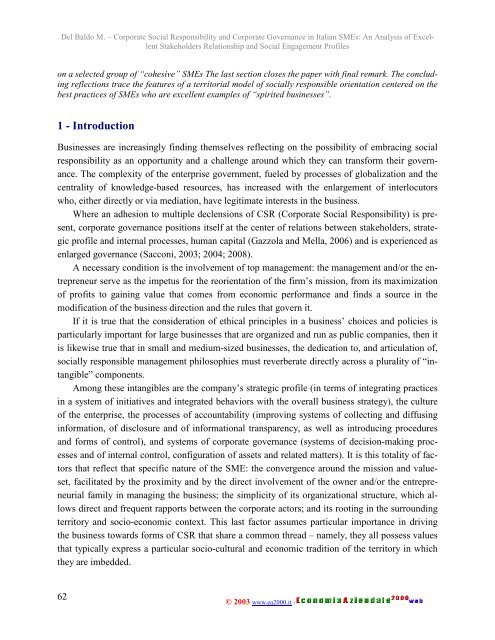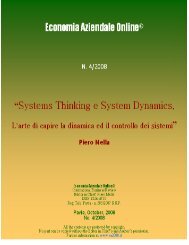Download this PDF file - Riviste
Download this PDF file - Riviste
Download this PDF file - Riviste
- No tags were found...
You also want an ePaper? Increase the reach of your titles
YUMPU automatically turns print PDFs into web optimized ePapers that Google loves.
Del Baldo M. – Corporate Social Responsibility and Corporate Governance in Italian SMEs: An Analysis of ExcellentStakeholders Relationship and Social Engagement Pro<strong>file</strong>son a selected group of “cohesive” SMEs The last section closes the paper with final remark. The concludingreflections trace the features of a territorial model of socially responsible orientation centered on thebest practices of SMEs who are excellent examples of “spirited businesses”.1 - IntroductionBusinesses are increasingly finding themselves reflecting on the possibility of embracing socialresponsibility as an opportunity and a challenge around which they can transform their governance.The complexity of the enterprise government, fueled by processes of globalization and thecentrality of knowledge-based resources, has increased with the enlargement of interlocutorswho, either directly or via mediation, have legitimate interests in the business.Where an adhesion to multiple declensions of CSR (Corporate Social Responsibility) is present,corporate governance positions itself at the center of relations between stakeholders, strategicpro<strong>file</strong> and internal processes, human capital (Gazzola and Mella, 2006) and is experienced asenlarged governance (Sacconi, 2003; 2004; 2008).A necessary condition is the involvement of top management: the management and/or the entrepreneurserve as the impetus for the reorientation of the firm’s mission, from its maximizationof profits to gaining value that comes from economic performance and finds a source in themodification of the business direction and the rules that govern it.If it is true that the consideration of ethical principles in a business’ choices and policies isparticularly important for large businesses that are organized and run as public companies, then itis likewise true that in small and medium-sized businesses, the dedication to, and articulation of,socially responsible management philosophies must reverberate directly across a plurality of “intangible”components.Among these intangibles are the company’s strategic pro<strong>file</strong> (in terms of integrating practicesin a system of initiatives and integrated behaviors with the overall business strategy), the cultureof the enterprise, the processes of accountability (improving systems of collecting and diffusinginformation, of disclosure and of informational transparency, as well as introducing proceduresand forms of control), and systems of corporate governance (systems of decision-making processesand of internal control, configuration of assets and related matters). It is <strong>this</strong> totality of factorsthat reflect that specific nature of the SME: the convergence around the mission and valueset,facilitated by the proximity and by the direct involvement of the owner and/or the entrepreneurialfamily in managing the business; the simplicity of its organizational structure, which allowsdirect and frequent rapports between the corporate actors; and its rooting in the surroundingterritory and socio-economic context. This last factor assumes particular importance in drivingthe business towards forms of CSR that share a common thread – namely, they all possess valuesthat typically express a particular socio-cultural and economic tradition of the territory in whichthey are imbedded.62© 2003 www.ea2000.it -
















